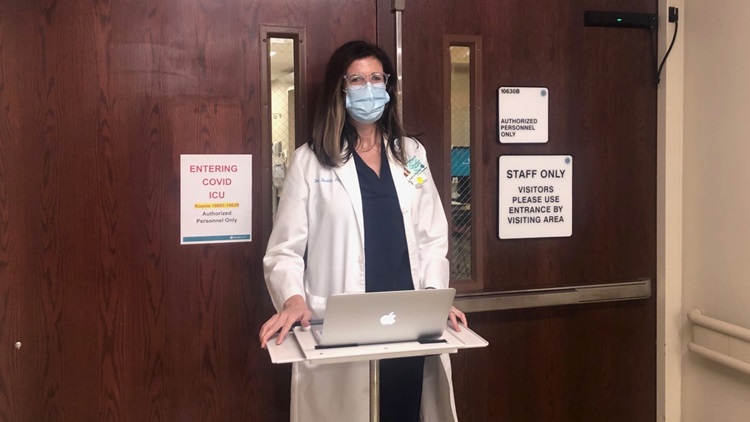For Danya Roshdy, PharmD, becoming a pharmacist, equated to joining the family business.
“I come from a long line of pharmacists, so kind of carrying the torch,” she explains. “My grandmother was the first female pharmacist in Syria.”
For the last six years, the clinical pharmacist has worked as part of Atrium Health’s Antimicrobial Support Network (ASN). The ASN is a multidisciplinary team of pharmacists who work closely with infectious diseases physician colleagues to assist in the optimal selection, dosage, and duration of antimicrobial therapy.

Roshdy, who specializes in infectious diseases, often rounded with Atrium Health’s infectious disease consult service and saw patients throughout the hospital with complicated infectious disease issues. Roshdy’s expertise allows her to assist the primary team in managing some of those more complicated infections.
But like the rest of us, the onset of COVID-19 forced Roshdy and her clinical pharmacist colleagues to pivot.
“COVID-19 really upended everything back in March,” Roshdy explains.
With so many unknowns surrounding this new disease, Roshdy says, they found it was nearly impossible to stay on top of all the information that was coming out.
“It was like trying to drink water from a fire hose,” she recalls. “It seemed like by the hour there were new articles coming out that we would get asked about the effectiveness of certain treatments.”
With infectious disease physicians handling a larger volume of patients, Roshdy believes her team helped fill a gap in helping to screen patients and providing drug monitoring.
That led to the assembly of the ID/ASN COVID Working Group. It’s a multidisciplinary committee of infectious disease pharmacists, infectious disease physicians and a critical care pharmacist. The working group serves as a subcommittee of Atrium Health’s larger COVID-19 task force, reviewing new research and providing recommendations about the treatment of COVID-19.
“We spent a lot of time the first couple months of the pandemic just trying to digest a lot of the emerging literature and provide recommendations to that working group,” Roshdy says.
Meanwhile, ASN also implemented a review process for all patients with COVID-19. They get reports twice a day of all patients with positive tests or pending test results. Patient charts are reviewed and the team works to put a treatment plan into place.
As the number of COVD-19 cases began to increase, ASN started to pre-identify patients it felt qualified for the investigational drug remdesivir, dedicating at least three pharmacists a day to review patients. In a meeting every morning, they make those recommendations to the group that includes infectious disease physicians.
“This is really kind of an unprecedented situation,” Roshdy says. “Almost never has a non-FDA approved drug been approved for use under an emergency use authorization like this.”
There’s a lot of coordination among clinical and operational pharmacy that happens after remdesivir is ordered because so much data about its implementation must be reported to the North Carolina Department of Health and Human Services. If patients have an adverse effect, the FDA must be notified so it can monitor the effects under its emergency use authorization. All in the effort to develop better treatments for COVID-19.
“Even now, we don’t have any FDA approved therapies for the treatment of COVID-19, so we’re kind of operating based on relatively limited data,” Roshdy explains, acknowledging that that has improved over the last few months.
With other diseases, like the flu, we have decades and decades of research on therapies and we know a lot about what treatments work best and when to use them. We don’t even have a full year of experience with COVID-19, increasing the complexity of Roshdy’s and the working group’s efforts.
“I think that this experience has been really valuable in helping demonstrate the value of clinical pharmacists in these scenarios,” Roshdy says.
But it’s the interdisciplinary teamwork and camaraderie that inspires Roshdy the most.
“Everybody in pharmacy has had to come together to make all of this happen and improve the care of our patients,” she says.
During Pharmacy Week, October 18-24, we are proud to highlight the interdisciplinary collaboration of all of our pharmacy teams with our physicians and clinical trial coordinators, and for the positive impact we’ve been able to have for our patients during this difficult time.



